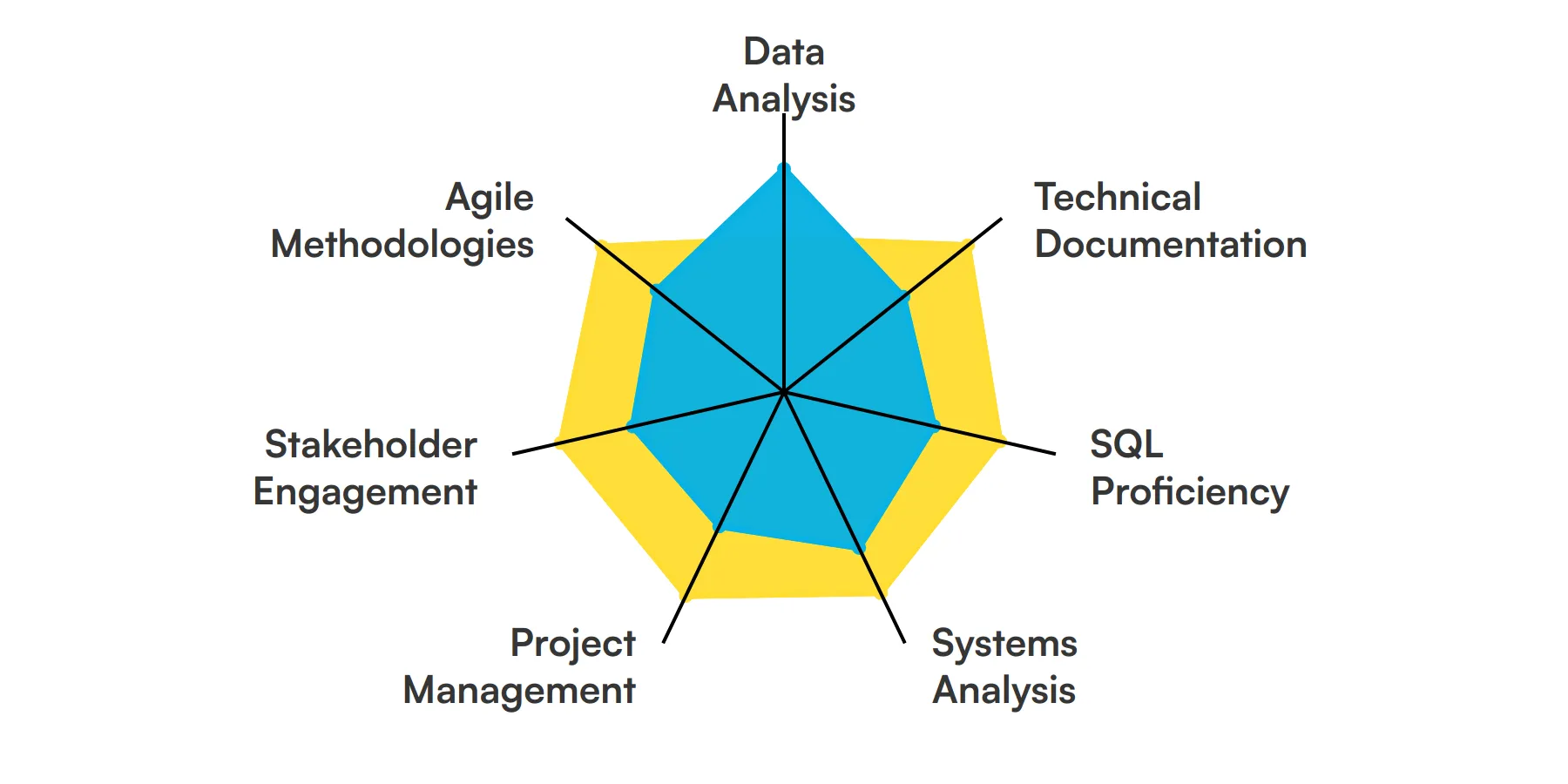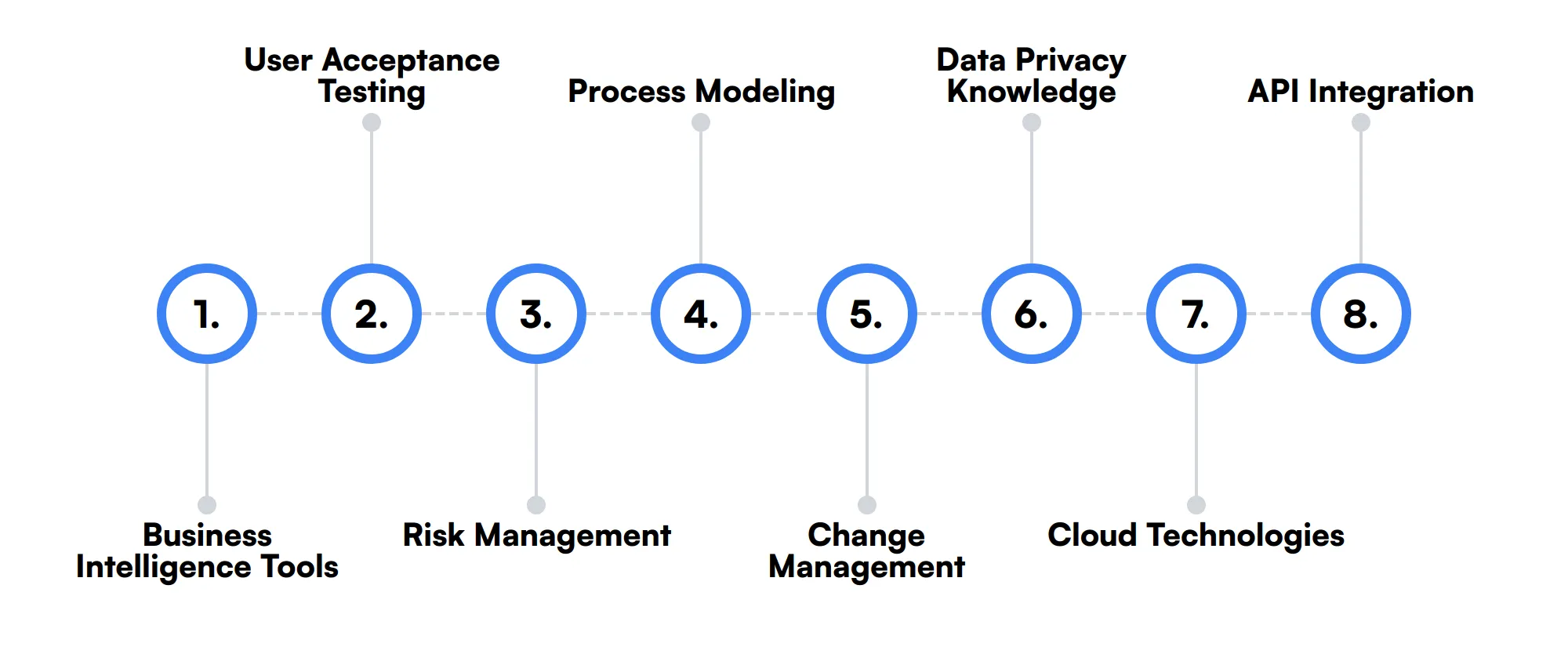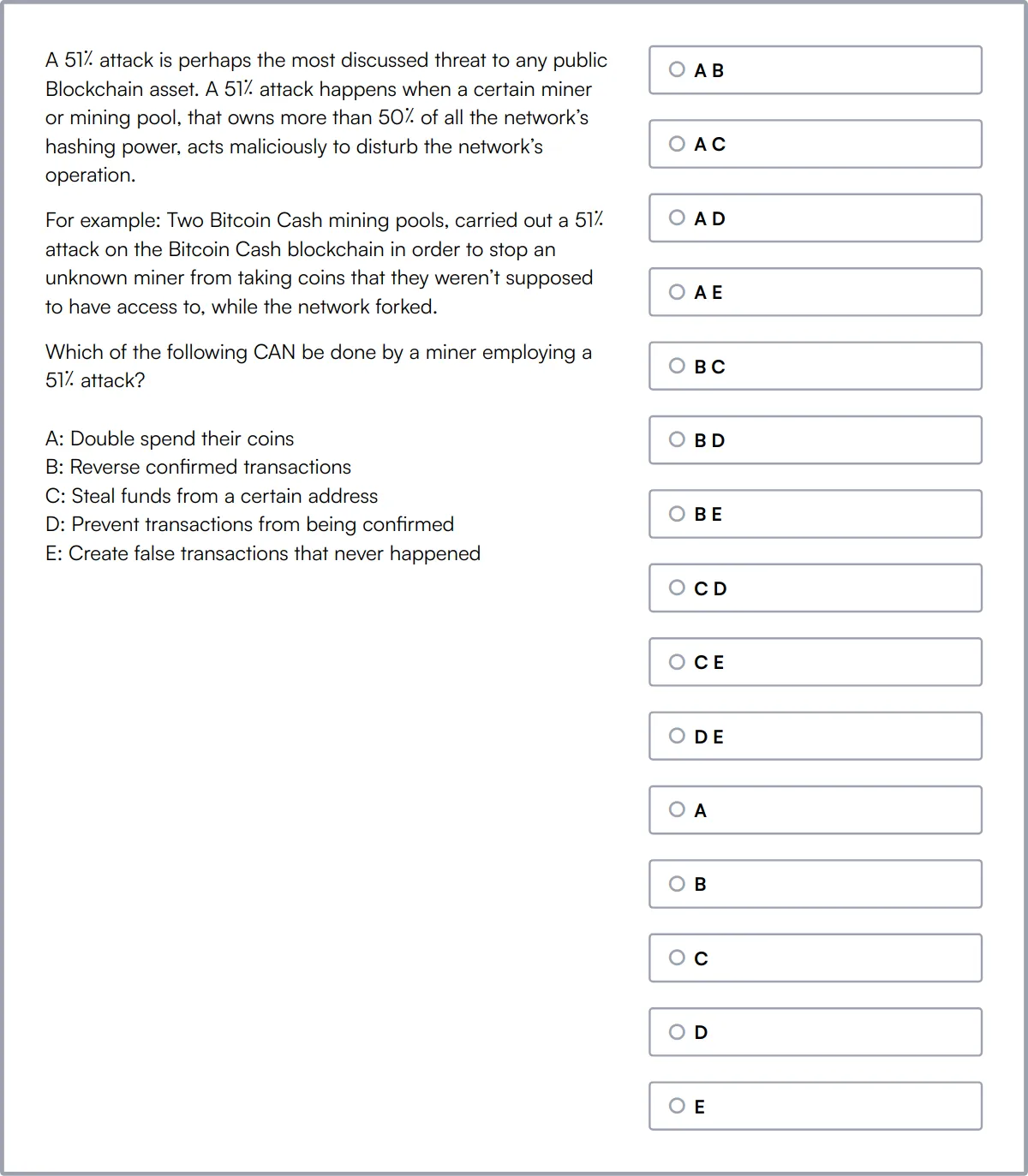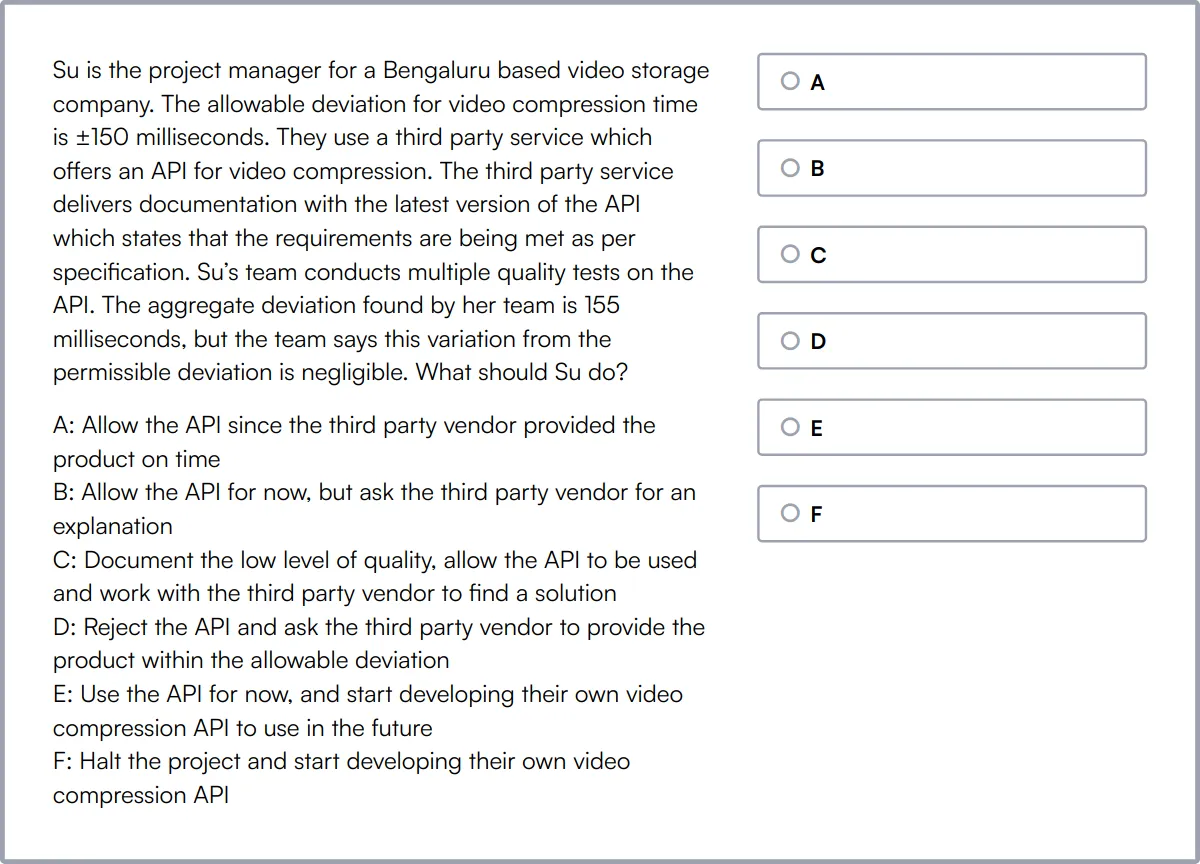Technical Business Analysts are at the heart of bridging business processes with technical solutions. They translate complex business needs into technical requirements, ensuring that systems and software effectively support the organization's goals.
The role requires a mix of technical proficiency, such as understanding data analysis, databases, and basic programming, alongside strong analytical and communication skills to liaise between stakeholders and technical teams.
Candidates can write these abilities in their resumes, but you can’t verify them without on-the-job Technical Business Analyst skill tests.
In this post, we will explore 7 essential Technical Business Analyst skills, 8 secondary skills and how to assess them so you can make informed hiring decisions.
Table of contents
7 fundamental Technical Business Analyst skills and traits
The best skills for Technical Business Analysts include Data Analysis, Technical Documentation, SQL Proficiency, Systems Analysis, Project Management, Stakeholder Engagement and Agile Methodologies.
Let’s dive into the details by examining the 7 essential skills of a Technical Business Analyst.

Data Analysis
A Technical Business Analyst must be adept at interpreting complex data sets to identify trends, make forecasts, and provide actionable insights. This skill is crucial for making informed decisions that align with business objectives.
For more insights, check out our guide to writing a Data Analyst Job Description.
Technical Documentation
Creating clear and comprehensive technical documentation is key for a Technical Business Analyst. This includes system requirements, project specifications, and process manuals, which are essential for project transparency and stakeholder communication.
SQL Proficiency
Proficiency in SQL allows the Technical Business Analyst to query databases effectively, extract vital business data, and perform data manipulation. This skill supports data-driven decision-making processes within the organization.
Check out our guide for a comprehensive list of interview questions.
Systems Analysis
Understanding and analyzing existing systems to identify areas for improvement or troubleshooting issues is a fundamental role of a Technical Business Analyst. This involves evaluating system workflows, user requirements, and system constraints.
Project Management
Managing timelines, resources, and stakeholder expectations are part of a Technical Business Analyst's responsibilities. Effective project management ensures that business solutions are delivered on time and meet predefined specifications.
For more insights, check out our guide to writing a Project Manager Job Description.
Stakeholder Engagement
Engaging with stakeholders to gather requirements and ensure their needs are met in the system design and final product is critical. This skill helps in building and maintaining strong, productive relationships.
Agile Methodologies
Familiarity with Agile methodologies is essential for a Technical Business Analyst working in dynamic development environments. This knowledge helps in adapting to changes quickly and working efficiently in sprint-based project cycles.
Check out our guide for a comprehensive list of interview questions.
8 secondary Technical Business Analyst skills and traits
The best skills for Technical Business Analysts include Business Intelligence Tools, User Acceptance Testing, Risk Management, Process Modeling, Change Management, Data Privacy Knowledge, Cloud Technologies and API Integration.
Let’s dive into the details by examining the 8 secondary skills of a Technical Business Analyst.

Business Intelligence Tools
Experience with BI tools like Tableau or Power BI helps a Technical Business Analyst in visualizing data and presenting it in an understandable form to stakeholders.
User Acceptance Testing
Coordinating and overseeing user acceptance testing ensures that the final product meets the business requirements and is free from critical issues.
Risk Management
Identifying potential risks and developing strategies to mitigate them is important to ensure project success and sustainability.
Process Modeling
Skills in process modeling, including the use of BPMN tools, enable the Technical Business Analyst to document business processes clearly and effectively.
Change Management
Managing changes in project scope or technology effectively ensures minimal disruption and maintains project momentum.
Data Privacy Knowledge
Understanding data protection regulations and implementing measures to comply with privacy laws are important to safeguard sensitive information.
Cloud Technologies
Knowledge of cloud services and platforms aids in evaluating and implementing scalable, efficient solutions.
API Integration
Skills in API integration facilitate seamless connectivity between different software systems, enhancing functionality and user experience.
How to assess Technical Business Analyst skills and traits
Assessing the skills and traits of a Technical Business Analyst can be a challenging task. These professionals need a blend of technical and interpersonal skills to bridge the gap between IT and business teams effectively. It's not just about what they know, but how they apply their knowledge in real-world scenarios.
While resumes can highlight qualifications and experience, they often fall short in demonstrating a candidate's true capabilities. Skills-based hiring practices, such as talent assessments, provide a more accurate picture of a candidate's competencies. For instance, Adaface assessments can help you achieve 2x improved quality of hires by focusing on key skills like Data Analysis, SQL Proficiency, and Project Management.
The type of Technical Business Analyst you need will depend on the specific requirements of your projects and the tools you use. Whether it's Systems Analysis, Technical Documentation, or Stakeholder Engagement, having a tailored assessment can ensure you find the right fit for your team. Adaface offers a variety of tests that can be customized to match your specific needs, helping you reduce screening time by 85%.
Let’s look at how to assess Technical Business Analyst skills with these 6 talent assessments.
Data Analysis Test
Our Data Analysis Test evaluates a candidate's ability to analyze and interpret data, crucial for roles requiring the extraction of actionable insights from complex datasets.
The test assesses skills in data modeling, analysis, SQL queries, and the use of tools like Excel. Candidates must demonstrate their ability to perform aggregations, statistical analysis, and data visualization.
Successful candidates will show proficiency in detecting anomalies, predicting outcomes, and using data to support business decisions. The test is tailored to reflect the specific data analysis needs of your organization.

Technical Aptitude Test
Our Technical Aptitude Test screens candidates for general technical knowledge and problem-solving abilities, applicable across various IT roles.
This test covers programming fundamentals, data structures, algorithms, and system administration, among other areas. Candidates need to apply logical reasoning and analytical skills to solve scenario-based problems.
High-scoring individuals are adept at critical thinking and can effectively tackle complex technical challenges, making them suitable for advanced technical positions.
SQL Online Test
The SQL Online Test is designed to assess a candidate's expertise in SQL, from basic commands to complex queries and database management.
Candidates are tested on their ability to create and manage databases, perform CRUD operations, and write optimized queries using joins, subqueries, and indexes.
Those who excel in the test can efficiently handle database scalability and security, crucial for roles involving extensive data manipulation.

Business Analyst IT Test
Our Business Analyst IT Test evaluates the core competencies required in IT business analysis, including requirements gathering and system design.
The test measures knowledge in SQL, data analysis, and project management, with a focus on Agile and Scrum methodologies. Candidates must demonstrate their ability to analyze business processes and propose improvements.
Effective candidates will show strong analytical thinking and communication skills, essential for translating business requirements into technical solutions.

Project Management Test
The Project Management Test assesses a candidate's ability to oversee projects from inception to completion, ensuring they meet budget, scope, and time constraints.
It covers risk analysis, resource management, and stakeholder engagement, with scenarios testing both Agile and traditional project management skills.
Candidates who perform well can effectively navigate project challenges, prioritize tasks, and manage diverse teams to achieve project goals.

Management Trainee Test
Our Management Trainee Test is crafted to identify emerging leaders by evaluating their problem-solving and decision-making skills.
The test challenges candidates on various fronts including leadership, teamwork, and project management, assessing their ability to lead and work effectively within a team.
High performers in the test are likely to possess strong analytical and critical thinking skills, preparing them for successful careers in management.
Summary: The 7 key Technical Business Analyst skills and how to test for them
| Technical Business Analyst skill | How to assess them |
|---|---|
| 1. Data Analysis | Evaluate candidate's ability to interpret and derive insights from data. |
| 2. Technical Documentation | Assess clarity, detail, and comprehensiveness of technical specifications and manuals. |
| 3. SQL Proficiency | Test candidate's skills in writing optimized SQL queries and managing databases. |
| 4. Systems Analysis | Review ability to analyze, design, and improve information systems. |
| 5. Project Management | Check proficiency in planning, executing, and finalizing projects within deadlines. |
| 6. Stakeholder Engagement | Observe skills in managing and communicating effectively with stakeholders. |
| 7. Agile Methodologies | Determine familiarity with agile practices and ability to adapt to iterative processes. |
AI Product Manager Test
Technical Business Analyst skills FAQs
What are the key skills required for a Technical Business Analyst?
Key skills include Data Analysis, Technical Documentation, SQL Proficiency, Systems Analysis, Project Management, Stakeholder Engagement, Agile Methodologies, Business Intelligence Tools, User Acceptance Testing, Risk Management, Process Modeling, Change Management, Data Privacy Knowledge, Cloud Technologies, and API Integration.
How can recruiters assess Data Analysis skills in a Technical Business Analyst?
Recruiters can assess Data Analysis skills by reviewing candidates' experience with data visualization tools, their ability to interpret data trends, and their proficiency in statistical analysis.
Why is SQL Proficiency important for a Technical Business Analyst?
SQL Proficiency is important because it allows Technical Business Analysts to query databases, extract relevant data, and perform data manipulation to support business decisions.
What methods can be used to evaluate a candidate's Project Management skills?
Evaluate Project Management skills by discussing past projects, understanding their approach to planning and execution, and reviewing any certifications like PMP or PRINCE2.
How do Agile Methodologies benefit a Technical Business Analyst?
Agile Methodologies help Technical Business Analysts adapt to changing requirements, collaborate effectively with cross-functional teams, and deliver incremental value.
What is the significance of Stakeholder Engagement in a Technical Business Analyst role?
Stakeholder Engagement is significant as it ensures that the needs and expectations of all parties are understood and met, leading to successful project outcomes.
How can recruiters test a candidate's knowledge of Business Intelligence Tools?
Recruiters can test this by asking about the candidate's experience with tools like Tableau, Power BI, or Qlik, and requesting examples of how they have used these tools to generate insights.
What are some ways to assess a candidate's experience with API Integration?
Assess API Integration experience by discussing specific projects where the candidate integrated different systems, their understanding of RESTful services, and their ability to troubleshoot integration issues.
Assess and hire the best Technical Business Analysts with Adaface
Assessing and finding the best Technical Business Analyst is quick and easy when you use talent assessments. You can check out our product tour, sign up for our free plan to see talent assessments in action or view the demo here:

40 min skill tests.
No trick questions.
Accurate shortlisting.
We make it easy for you to find the best candidates in your pipeline with a 40 min skills test.
Try for freeRelated posts
Free resources



